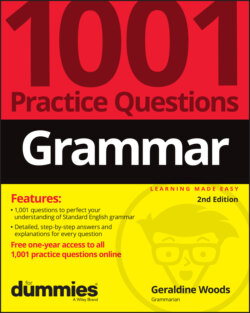Читать книгу Grammar: 1001 Practice Questions For Dummies (+ Free Online Practice) - Woods Geraldine, Geraldine Woods - Страница 4
Introduction
ОглавлениеThis is a book of questions, so I'll start with one: What can 1001 Grammar Questions For Dummies do for you?
1 provide a bit of fun, if you like quizzes
2 prepare you for standardized tests
3 help you earn higher grades and increase your chances of getting a better job
4 keep you up to date on recent trends in grammar
5 all of the above
Answer (E)
Explanation: Choice (A) is correct because this book is a collection of mini-quizzes on every aspect of grammar and writing. No one is grading you, so you can just enjoy yourself. Because standardized test-writers include the topics I cover in this book, choice (B) is also right. Choice (C) is true because authority figures evaluating your work may downgrade their assessment of your skills if you don't write and speak according to the conventions of Standard English. I'm not saying you'll be fired if you plug in the wrong verb tense or send an adjective to do an adverb's job, but our society often uses Standard English as a gatekeeper. If you show that you know how to follow its rules, doors open. Was Choice (D) a surprise? Teachers often give the impression that the rules of English grammar are etched in stone. Not so! Language arises from human beings, and as life changes, so does the way we talk about it.
The questions in this book reflect currently accepted usage in Standard English. If you already speak and write well, you can dip into this book to refine your knowledge. If English is a language you’re still learning, you can concentrate on questions that address basic concepts and gradually work your way to more advanced points. In addition to 1,001 questions, this book provides answers and explanations, so you know why a particular expression is correct (or incorrect) in Standard English. In the explanations, I stay away from technical terms as much as possible, including only the specialized vocabulary you absolutely need to grasp the underlying logic or traditions of the language. I stay with the simplest terms and define them as they appear, in case you’re not familiar with a term or you learned a different one in school. And you may have! Grammarians love jargon. For example, many bloody battles have been fought between those who favor the terms predicate nominative and predicate adjective and those who prefer the label subject complement. (Both apply to a word that follows a form of the verb to be.) Okay, I’m exaggerating a little. Maybe blood hasn’t been shed, but an ocean of ink has! My view is that as long as you know proper usage, you can call something a cantaloupe for all I care.
